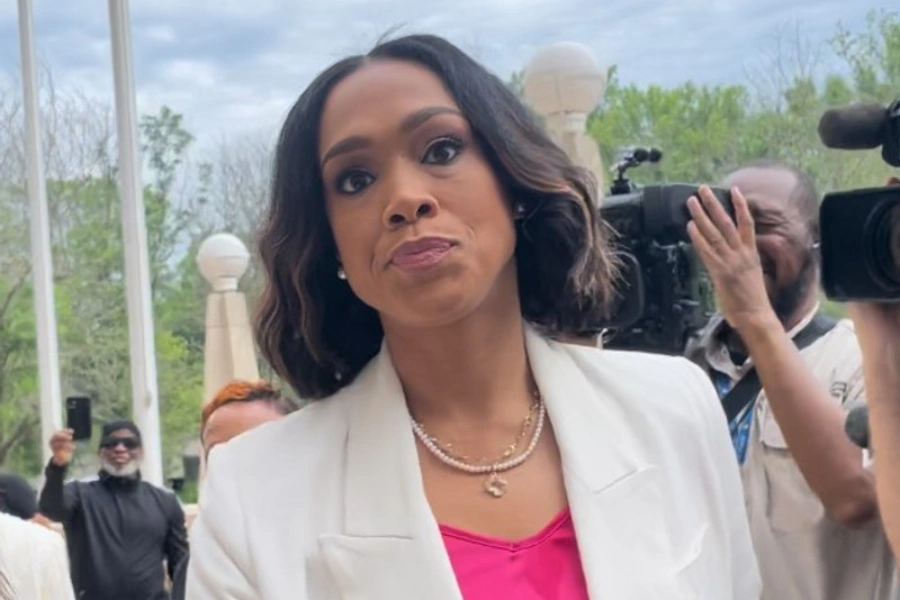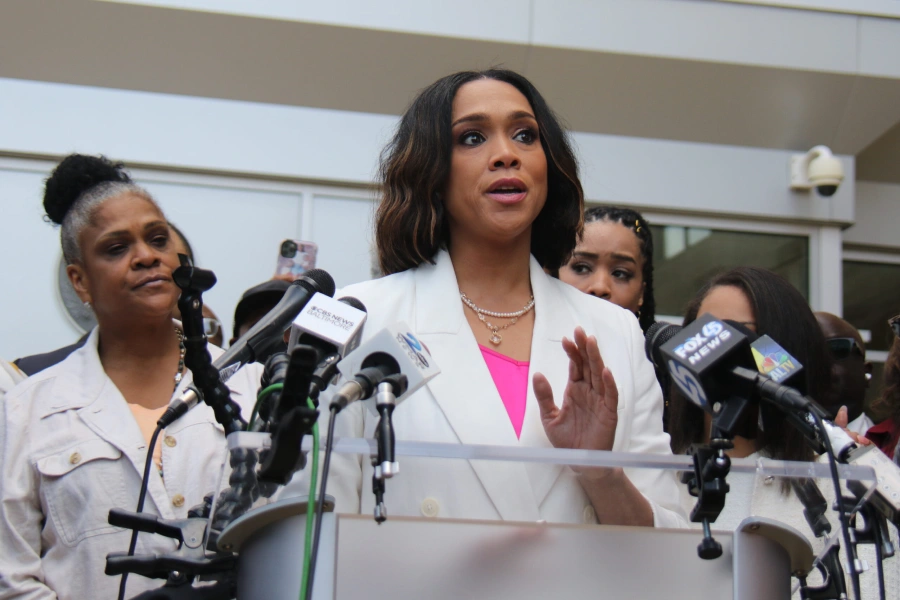Marilyn Mosby, the former Baltimore City State’s Attorney, has become the centerpiece of a high-stakes legal and political drama. Her conviction for mortgage fraud was recently vacated by the U.S. Court of Appeals for the Fourth Circuit, while her perjury convictions remain intact. Now, she and federal prosecutors both seek a rehearing en banc. The case raises fundamental questions about venue, statutory ambiguity, jury instructions, and prosecutorial strategy. In this article, we will analyze the facts of the case, the court’s reasoning, the possible paths ahead, and the broader legal significance.

Background: Marilyn Mosby’s Indictment, Trials, and Convictions
From 2022 onward, Marilyn Mosby faced federal indictments for multiple alleged violations. According to public records and court filings, she was charged with:
-
Perjury under the CARES Act: She claimed “adverse financial consequences” from COVID-19 to justify withdrawing funds from her deferred compensation (retirement) accounts without penalties. Critics argued her salary had not declined, and she had not experienced financial distress. Wikipedia+2Fourth Circuit Court+2
-
Mortgage fraud and false statements: She allegedly bought two Florida properties but lied in mortgage documents, failing to disclose federal tax liabilities and misrepresenting a “gift” from her husband to improve loan terms. Capital B News+4Maryland Matters+4Fourth Circuit Court+4
In bifurcated jury trials, the jury convicted her of both perjury and mortgage fraud. The district court also entered a forfeiture order for one of the Florida properties based on the fraud conviction. Fourth Circuit Court+2Maryland Matters+2
Mosby was later sentenced in May 2024 to one year of home detention, 100 hours of community service, and a period of supervised release. The Washington Post+1
Appeal Decision: Fourth Circuit’s Ruling on Marilyn Mosby’s Case
Overturning the Mortgage Fraud Conviction
In July 2025, a three-judge panel of the Fourth Circuit (Judges Thacker, Agee, and Niemeyer) issued a split decision: they vacated the mortgage fraud conviction but upheld the perjury convictions. WBFF+3Maryland Matters+3Fourth Circuit Court+3
The key basis was an erroneous jury instruction on venue. The panel concluded that the district court’s instruction allowed the jury to convict even if the acts underlying the crime did not properly occur in Maryland, essentially giving the jury too much leeway. Fourth Circuit Court+2Maryland Matters+2
Because the forfeiture order depended on the fraud conviction, it also was vacated. Fourth Circuit Court+1
Upholding the Perjury Convictions
On the perjury counts, the Fourth Circuit found no error by the lower court. Mosby’s arguments that the predicate question was “fundamentally ambiguous” or that cross-examination was improper were rejected. Maryland Matters+3Fourth Circuit Court+3WBFF+3
Thus, the ruling is a partial victory: she loses the fraud conviction but remains convicted for perjury. Maryland Matters+2WBFF+2
Marilyn Mosby and Rehearing En Banc: What’s at Stake
What is Rehearing En Banc?
A rehearing en banc means that instead of just three judges, all active judges of the Fourth Circuit (or a significant subset) will consider the case. This is typically granted only for cases of exceptional importance or when prior panel decisions may conflict.
Why Both Sides Want It
-
Mosby’s position: Her legal team contends that the panel did not properly address jury confusion, and that upholding the perjury verdict based on vague statutory language sets a dangerous precedent. They argue she is the only person ever prosecuted under the CARES Act based on such claims, giving this case national significance. WBFF+1
-
Prosecutors’ position: The government agrees a full court review is needed but asks the court to reinstate the fraud conviction, arguing that the panel revived a nearly 90-year-old precedent (Reass) that misinterpreted venue law. WBFF
If the en banc court agrees with prosecutors, Mosby’s fraud conviction could be reinstated. Conversely, if they uphold the panel’s venue logic or expand the ambiguity argument, her perjury convictions might also be vulnerable.
Legal Analysis: Key Issues in Marilyn Mosby’s Case
Venue Instruction and Constitutional Safeguards
Under the Sixth Amendment and Rule 18 of the Federal Rules of Criminal Procedure, a criminal trial must occur in the district where the offense was committed. Jury instructions that allow a broader interpretation can violate a defendant’s rights. The Fourth Circuit panel found the district court’s instruction “erroneously overbroad.” Fourth Circuit Court+2WBFF+2
A close question is whether the error was prejudicial—i.e., whether it impacted a reasonable probability of a different verdict. The panel concluded yes. But in an en banc setting, judges may differ over how far that error goes, especially concerning complex evidence span between Maryland and Florida transactions.
Ambiguity of the “Adverse Financial Consequences” Clause
Mosby’s defense claims that the CARES Act’s language regarding “adverse financial consequences” is vague and that the jury instructions did not properly define it. If true, this could render part of her perjury convictions unconstitutional under due process principles (i.e. void for vagueness). Maryland Daily Record+1
However, the panel rejected this, holding that the statute and the predicate questions were sufficiently clear to a jury. An en banc court might revisit the clarity threshold and whether ambiguity could allow undue prosecutorial overreach.
Forfeiture, Remedies, and Collateral Consequences
Because the fraud conviction was vacated, the forfeiture order for the Florida condo was voided. Courts often regard forfeiture as an equitable remedy dependent on underlying convictions. Fourth Circuit Court+2Maryland Matters+2
But questions remain: Are there other collateral consequences (like tax claims) unresolved? Moreover, even if fraud is reinstated, whether forfeiture can be reimposed may depend on statutory limits and appellate rules.
Precedent and National Implications
If en banc judges modify or limit the venue doctrine, the ripple effects may impact federal prosecutions across districts. The perjury question under CARES Act could also become a touchstone for other litigants who made pandemic-related withdrawal claims.
In addition, the notion that an entire appeals court should reconsider prior panel decisions is not taken lightly; granting rehearing en banc itself would signal that the Fourth Circuit recognizes the stakes in Marilyn Mosby’s case.
Possible Outcomes & What to Watch
Here are some likely scenarios:
-
En banc upholds panel’s decision — Fraud stays vacated, perjury convictions remain. Mosby’s property returns, but she remains convicted.
-
En banc reinstates fraud conviction — Mosby’s conviction is fully restored. Forfeiture may return.
-
En banc overturns perjury convictions or finds ambiguity — This would be a dramatic reversal, potentially vacating all convictions.
-
Partial remand with guidance — The en banc court might refine rules around venue instruction or jury clarity but leave some convictions intact.
Watch for the court’s decision to rehear; whether dissenting opinions or conflicting Fourth Circuit precedents influence the vote; and whether the Supreme Court might be drawn in later.
Marilyn Mosby: Why Her Case Dominates Legal Commentary
The name Marilyn Mosby has become almost emblematic in legal circles. Her case combines criminal law, constitutional rights, pandemic-era statutory interpretation, and high-stakes political context. The stakes are not just personal for Mosby; the ruling could influence how appellate courts handle venue challenges, jury instructions, statutory vagueness, and forfeiture tied to criminal convictions.
For legal scholars and practitioners, her case is a real-time test of how appellate doctrine adapts to complex, multi-jurisdictional evidence in modern white-collar prosecutions.
Conclusion
Marilyn Mosby’s journey through the courts is far from over. While she achieved a partial victory with the vacated mortgage fraud conviction, her perjury convictions remain. The decision to request a rehearing en banc indicates that both sides view this as a pivotal moment. The forthcoming en banc ruling could reshape legal doctrine on venue, jury instructions, and statutory clarity in criminal law.
For observers, scholars, and litigators, “Marilyn Mosby” will continue to serve as a reference point in discussions over appellate power, criminal procedure, and the balance between prosecutorial authority and defendant rights.
What happened in the Marilyn Mosby mortgage fraud case?
Marilyn Mosby was convicted of mortgage fraud and perjury in separate trials. The Fourth Circuit recently vacated her mortgage fraud conviction (finding error in the jury venue instruction) but upheld her perjury convictions. Fourth Circuit Court+2Maryland Matters+2
Why was Marilyn Mosby’s mortgage fraud conviction vacated?
The appeals panel found that the jury instruction on venue was overly broad: it allowed jurors to convict even if the core acts of the crime did not properly occur in Maryland. Because the forfeiture order was based on that conviction, it also was vacated. Fourth Circuit Court+2Maryland Matters+2
Are Marilyn Mosby’s perjury convictions still in effect?
Yes. The Fourth Circuit panel rejected her arguments challenging the perjury convictions and affirmed them. Fourth Circuit Court+2Maryland Daily Record+2
What does En Banc rehearing mean in the Mosby case?
An En Banc rehearing means that instead of just a three-judge panel, all (or many) active judges of the Fourth Circuit will reconsider the case. Both Mosby and federal prosecutors have petitioned for En Banc review after the split panel decision. Maryland Daily Record+2Fourth Circuit Court+2
What legal issues are involved in the Mosby appeal?
Key issues include:
-
Venue instruction: whether the jury was properly instructed about where the crime must be proven to have occurred.
-
Statutory ambiguity: whether the “adverse financial consequences” language under the CARES Act is too vague.
-
Forfeiture legitimacy: whether the government can enforce forfeiture tied to a conviction that has been vacated.
-
Prejudice and jury confusion: whether errors in instructions or presentation prejudiced her defense.
Fourth Circuit Court+2Maryland Daily Record+2
What are possible outcomes of the En Banc rehearing?
Possible outcomes include:
-
The En Banc court upholds the panel’s decision: fraud conviction stays vacated, perjury convictions remain.
-
The En Banc court reinstates the fraud conviction (and possibly the forfeiture).
-
The En Banc court overturns perjury convictions or finds that statutory ambiguity invalidates them.
-
The case is remanded with instructions to refine jury instructions or clarify law, but parts of the convictions may remain.
Can Marilyn Mosby keep her Florida property now?
Yes, for now. Since the fraud conviction (which was the basis for the forfeiture order) was vacated, the order to seize her property was reversed.

